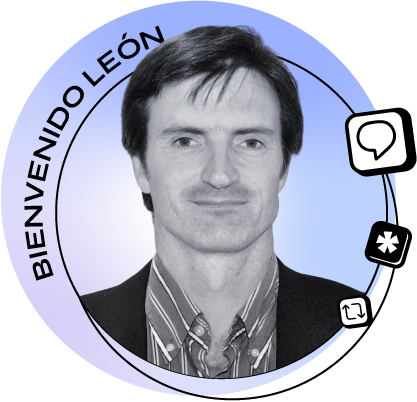El poder del storytelling
Un arma de doble filo
Quien comunica ciencia sabe que los datos rara vez hablan por sí solos. Para hilar las pruebas de manera atractiva, comprensible y memorable, hay que contar historias. Personajes, giros de guión y momentos emocionantes no son incompatibles con el rigor de nuestros vídeos, podcasts o artículos. ¿Pero estamos relatando de forma consciente? ¿Sabemos qué efectos tiene cada decisión narrativa en la audiencia?
En el primer evento del año 2022, analizaremos los ingredientes del storytelling para entender cómo influyen en cada público: en su interés, en su comprensión o, incluso, en su actitud.

Vídeo del evento
Vuelve a la retransmisión de YouTube para no perderte nada
En el primer evento del año 2022, analizamos los ingredientes del storytelling y cómo este ayuda a que las historias de ciencia resulten más atractivas sin perder rigor. Nos acompaña como voz experta Bienvenido León, profesor titular de periodismo científico y producción televisiva, y director del grupo de investigación sobre comunicación científica en la Universidad de Navarra.
Podcast del evento
Escucha todo el contenido en formato para llevar.
El artículo
Una buena historia bien contada: popularidad de vídeos de ciencia en YouTube
Huang, T. & Grant, W. J. (2020). A good story well told: Storytelling components that impact science video popularity on YouTube. Frontiers in Communication, 5, 86.

Huang, T. & Grant, W. J. (2020). A good story well told: Storytelling components that impact science video popularity on YouTube. Frontiers in Communication, 5, 86.
Ponente/s
Este mes, nos acompaña en el Journal Club Bienvenido León, profesor titular de periodismo científico y producción televisiva de la Universidad de Navarra, y director del grupo de investigación sobre comunicación de la ciencia en la misma universidad. León además es profesor visitante en las universidades de North Carolina y Colorado (EEUU), y Otago (N. Zelanda). Su investigación se centra en la comunicación de la ciencia y el medio ambiente en los medios audiovisuales, el género documental y la información televisiva. Ha publicado más de 100 artículos o capítulos con revisión por pares, además de 23 libros como autor, co-autor o editor. Es fundador y director del festival de cine científico #LabMeCrazy!

Información complementaria
Porque un paper es solo un paper
(Escaping) the paradox of scientific storytelling
Dahlstrom, M. F., & Scheufele, D. A. (2018). (Escaping) the paradox of scientific storytelling. PLoS Biology, 16(10), e2006720.
Characteristics of narrative interventions and health effects: A review of the content, form, and context of narratives in health-related narrative persuasion research
De Graaf, A., Sanders, J., & Hoeken, H. (2016). Characteristics of narrative interventions and health effects: A review of the content, form, and context of narratives in health-related narrative persuasion research. Review of Communication Research, 4, 88-131.
The role of prior attitudes in narrative persuasion: Evidence from a cross-national study in Germany and the United States
Oschatz, C., Niederdeppe, J., & Liu, J. (2021). The role of prior attitudes in narrative persuasion: Evidence from a cross-national study in Germany and the United States. Communication Monographs, 1-20.
(Escaping) the paradox of scientific storytelling
Dahlstrom, M. F., & Scheufele, D. A. (2018). (Escaping) the paradox of scientific storytelling. PLoS Biology, 16(10), e2006720.
Characteristics of narrative interventions and health effects: A review of the content, form, and context of narratives in health-related narrative persuasion research
De Graaf, A., Sanders, J., & Hoeken, H. (2016). Characteristics of narrative interventions and health effects: A review of the content, form, and context of narratives in health-related narrative persuasion research. Review of Communication Research, 4, 88-131.
The role of prior attitudes in narrative persuasion: Evidence from a cross-national study in Germany and the United States
Oschatz, C., Niederdeppe, J., & Liu, J. (2021). The role of prior attitudes in narrative persuasion: Evidence from a cross-national study in Germany and the United States. Communication Monographs, 1-20.
(Escaping) the paradox of scientific storytelling
Dahlstrom, M. F., & Scheufele, D. A. (2018). (Escaping) the paradox of scientific storytelling. PLoS Biology, 16(10), e2006720.
Characteristics of narrative interventions and health effects: A review of the content, form, and context of narratives in health-related narrative persuasion research
De Graaf, A., Sanders, J., & Hoeken, H. (2016). Characteristics of narrative interventions and health effects: A review of the content, form, and context of narratives in health-related narrative persuasion research. Review of Communication Research, 4, 88-131.
The role of prior attitudes in narrative persuasion: Evidence from a cross-national study in Germany and the United States
Oschatz, C., Niederdeppe, J., & Liu, J. (2021). The role of prior attitudes in narrative persuasion: Evidence from a cross-national study in Germany and the United States. Communication Monographs, 1-20.